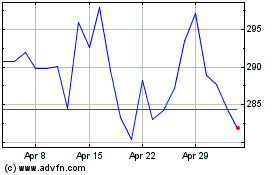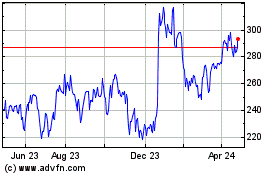Premier Oil's Losses Widen After Write-Downs
26 February 2016 - 12:00AM
Dow Jones News
LONDON—Premier Oil PLC, one of the U.K.'s biggest independent
oil companies, on Thursday reported a wider full-year loss after it
wrote down the value of some of its oil and gas fields by just over
$1 billion before tax because of the sharp decline in oil
prices.
It was the second consecutive year that Premier took an
impairment on its assets, highlighting the continued pain felt
across the energy industry as the oil price rout shows no signs of
abating.
From the smallest explorers and service companies all the way up
to the supermajors such as Exxon Mobil Corp. and Royal Dutch Shell
PLC, earnings have plummeted and profits have slumped amid the
decline in oil prices, which have fallen some 70% since mid-2014 to
around $35 a barrel currently.
While the entire oil and gas sector is suffering, the smaller
independents that play a key role opening up new regions of the
world to oil and gas development, have been at the sharp end of the
slumping oil price. Unlike the major oil companies, explorers don't
have other parts of their businesses to fall back on when oil
prices are down, such as refining and marketing, and have had to
slash costs and capital expenditure and delay more expensive
projects.
Premier has already reduced operating costs in 2015 by a quarter
and plans more cuts this year including a significant reduction in
capex this year and next.
"I don't think the oil price will stay at $35 for very long, but
what we're not doing is building a business that only survives at
$75 a barrel. We're getting our business into shape to survive a
sub-$50 oil price in the long run," Premier Chief Executive Tony
Durrant said in an interview.
One project that Premier has delayed is its Sea Lion oil field
in the Falkland Islands. The company has begun advanced engineering
for the development, which will take about 18 months.
"We're looking for further cost savings on Sea Lion. We're not
going to sanction the project today or if we're concerned about the
long-term price," Mr. Durrant said.
Premier's 2015 impairment was principally related to its Solan
field in the U.K. North Sea. It took the company's posttax loss to
$1.1 billion for the year ended Dec. 31, 2015 compared with a
posttax loss of $210 million the year before.
Revenue fell 35% to $1.07 billion on lower achieved oil and gas
prices and a 9% drop in oil and gas output to 57,600 barrels of oil
equivalent a day last year.
Premier's shares fell as much as 9.1% before paring back losses
to 39.8 pence each, down 4.36% on the day.
The company said it plans to produce 65,000 to 70,000 barrels of
oil equivalent a day following a contribution from its proposed
$135 million acquisition of German utility E.ON SE's U.K. North Sea
assets, which are mainly gas fields, and output from Solan, which
is due to start producing soon.
Premier said about 30% of its 2016 oil production will be hedged
at $73.4 a barrel once the acquisition of E.ON's U.K. assets
completes. Premier's net debt rose to $2.24 billion, up from $2.12
billion in 2014.
Write to Selina Williams at selina.williams@wsj.com and Alex
MacDonald at alex.macdonald@wsj.com
(END) Dow Jones Newswires
February 25, 2016 07:45 ET (12:45 GMT)
Copyright (c) 2016 Dow Jones & Company, Inc.
Harbour Energy (LSE:HBR)
Historical Stock Chart
From Jun 2024 to Jul 2024

Harbour Energy (LSE:HBR)
Historical Stock Chart
From Jul 2023 to Jul 2024
